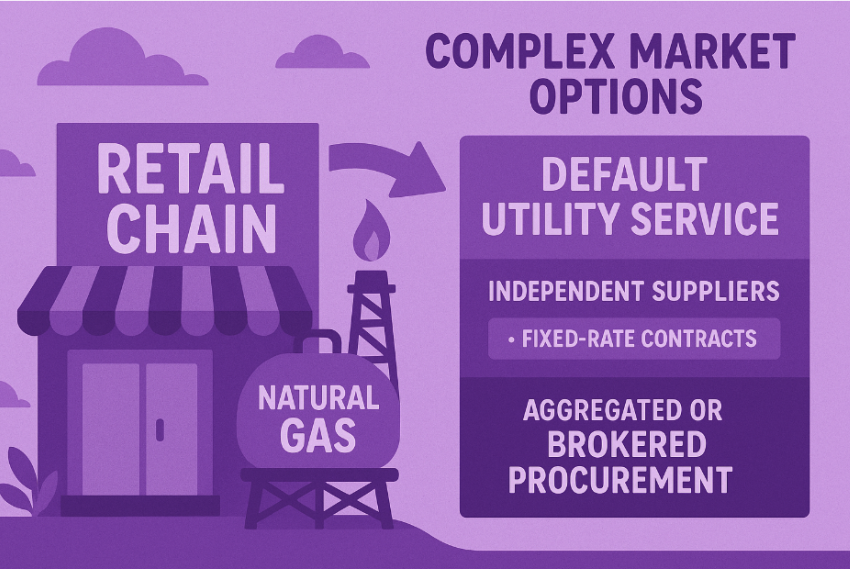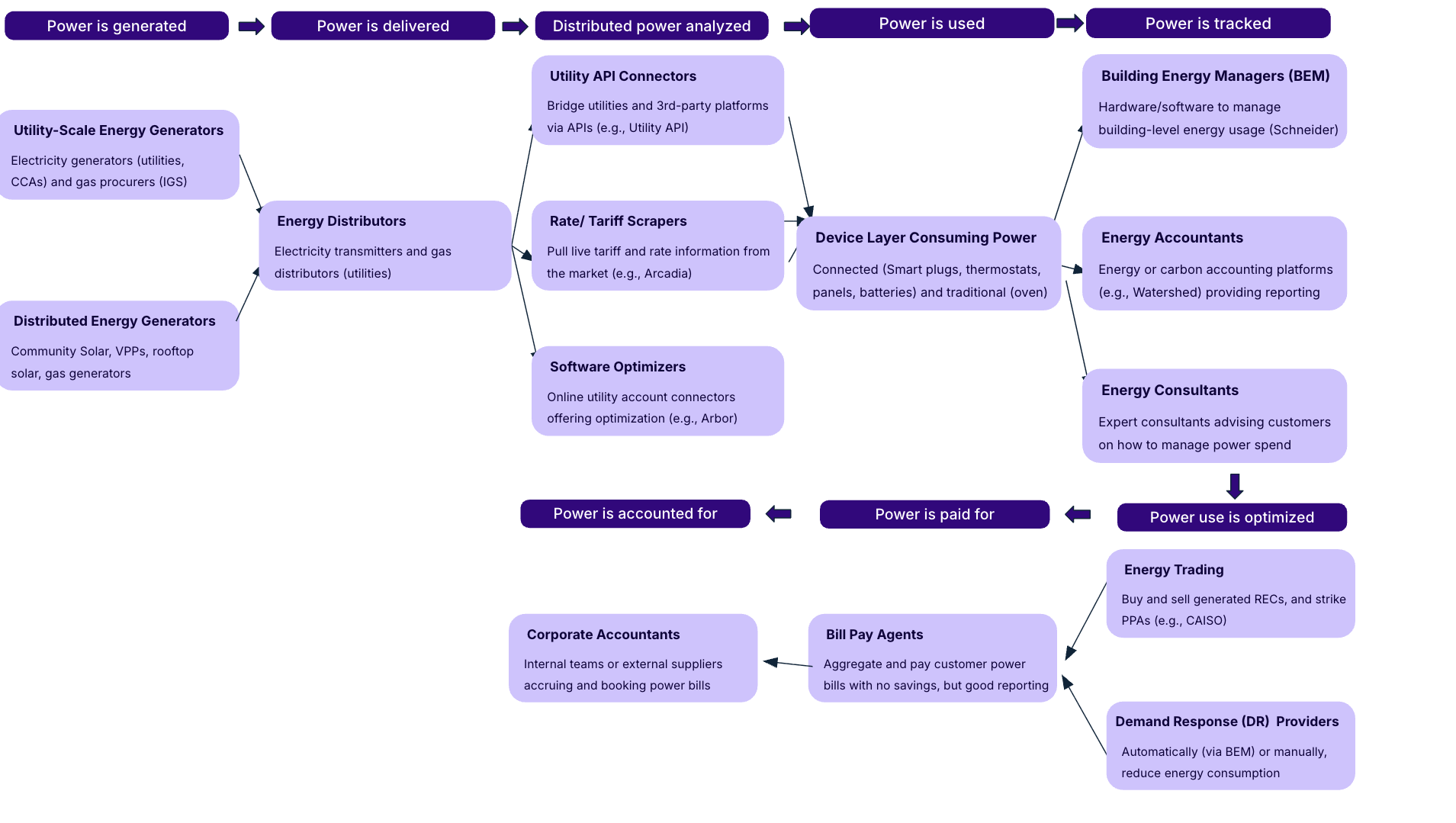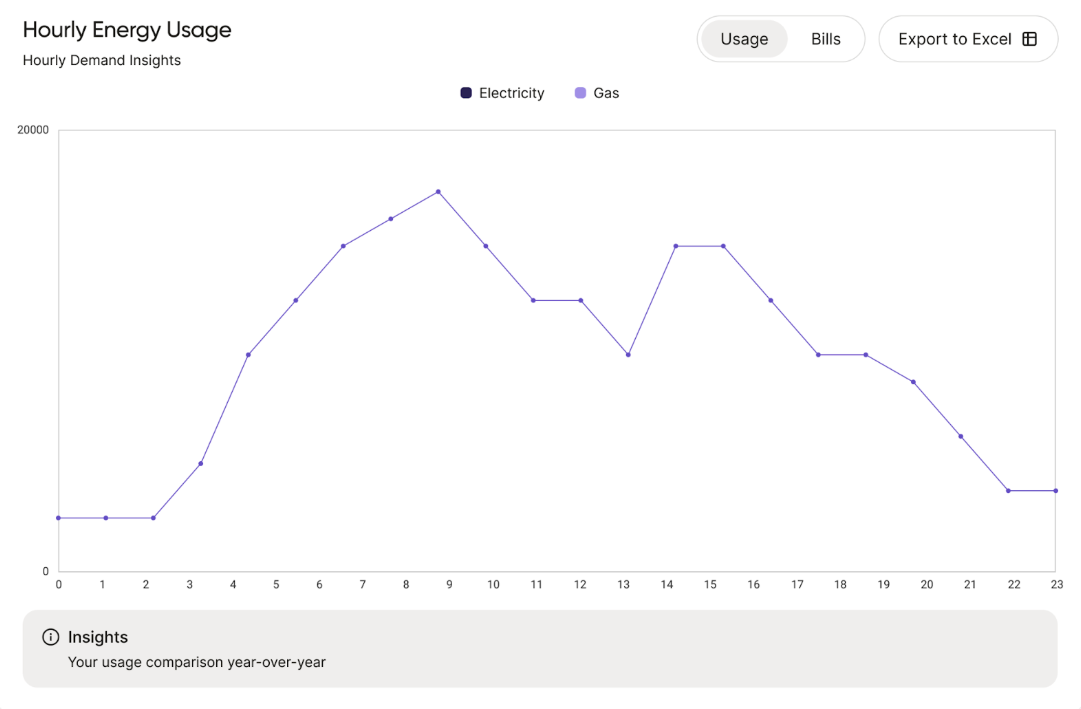Gas Procurement Options for Operators: What are the possibilities?
For many CFOs, natural gas procurement raises more questions than answers: Do we really have options beyond the utility? How do independent suppliers fit into the picture? And what rules apply in our state? In fact, in more places than you might expect, competitive energy markets give businesses a genuine choice—each with its own financial and regulatory implications. The challenge is turning that complexity into clarity. That’s where TrueMeter comes in, taking the burden off your plate while ensuring compliance, competitive pricing, and smarter energy decisions. We exist to lower your utility bills.

What are your options?
When it comes to securing energy, businesses typically have three main options: staying with the default utility service, contracting directly with an independent supplier, or working through aggregated or brokered procurement. Each approach offers different levels of flexibility, pricing, and complexity, making it important to choose the one that best fits your operational needs.
Default Utility Service:
Default utility service is pretty clear: It's going with state-regulated utility companies and they supply natural gas directly, usually under standard tariff rates. In regulated states, this may be the only option. In competitive states, it’s the “default” if no independent supplier is chosen.
Independent Suppliers:
These are classified as licensed suppliers that sell the natural gas commodity directly. Your local utility still handles the physical distribution (pipeline, meter, delivery), but billing and commodity pricing come from the supplier.
Independent Gas Suppliers offer a few different types of contracting models.
- The first contract option is fixed-rate contracts in which the set price per unit is locked for the contract duration. These contracts are the most common.
- The second is hybrid contracts in which one can purchase a portion of volume at a fixed price and leave the rest floating.
Aggregated or Brokered Procurement:
Businesses can join an aggregation pool or even hire an energy broker/consultant who negotiates with suppliers on their behalf. This can be structured as formal buying groups, chambers of commerce programs, or third-party consultants. Brokers leverage the combined purchasing power of multiple companies or use their expertise to solicit competitive bids.
Pros and Cons
With these options there’s benefits but there are also drawbacks. Here’s an overview on both options.
Option 1: Default Utility Provider
Pros
- Simplicity: No contracts to negotiate or market conditions to monitor.
- Reliability: Utilities are required by law to provide uninterrupted service.
- Administrative Ease: Straightforward billing, with charges consolidated on a single utility bill.
Cons
- Limited Flexibility: Rates are pass-through with little ability to hedge or manage risk.
- Cost Exposure: Pricing often lags behind the market, meaning businesses may overpay compared to competitive suppliers.
- No Strategic Alignment: Cannot customize procurement to fit budget predictability or risk management goals.
Option 2: Independent Suppliers
Pros
- Customization: Contract terms can be tailored to match the company’s budget cycle and risk tolerance.
- Cost Advantage: In competitive markets, supplier pricing often delivers better long-term value than utility rates.
- Added Services: Many suppliers offer extras such as energy usage reporting, demand forecasting, and sustainability tracking.
Cons
- Administrative Burden: Requires ongoing contract negotiations, performance monitoring, and supplier relationship management.
- Compliance Risk: Companies must navigate state-specific regulations and carefully review terms to avoid predatory contracts.
Option 3: Aggregated or Brokered Procurement
Pros
- Economies of Scale: Pooling demand across multiple businesses often unlocks lower rates.
- Expertise: Brokers provide market intelligence and manage supplier negotiations.
- Time Savings: Reduces the administrative burden of procurement and supplier management.
Cons
- Transparency Concerns: Some brokers are paid by suppliers, creating potential conflicts of interest.
- Less Direct Control: Businesses may have limited ability to customize contract terms.
- Quality Variance: Outcomes depend heavily on the broker’s credibility and track record.
TrueMeter as an Option
At TrueMeter, we act as your automated energy agent—replacing traditional utility bills with lower-cost, fixed-price payment plans. Our goal is simple: to put natural gas procurement on autopilot so you don’t have to think about it. Each month, we go to bat on your behalf to secure the lowest available gas rates, ensuring you’re never overpaying. And we don’t stop at a single location—we cover all of your business sites, delivering consistent savings across your entire footprint. As your energy broker, cost cutting is our top priority, and we negotiate directly with suppliers to secure the best business energy rates.
Tips for Success
- Match contract to strategy: Align fixed, index, or hybrid pricing with your risk tolerance and budget goals.
- Understand your usage: Review historical consumption to avoid misaligned contract terms.
- Use expert support: Leverage advisors or platforms like TrueMeter to simplify procurement and ensure compliance.
FAQs
If I switch to an independent supplier, does the utility still deliver the gas?
Yes. The local utility continues to operate the pipelines and meters. The supplier only provides the commodity itself, so there’s no risk to reliability of service.
What if market prices drop after I sign a fixed-rate contract?
You may end up paying above-market temporarily, but many CFOs accept this trade-off in exchange for budget predictability. Hybrid or block contracts are a good way to balance this risk.
How do I know if my state allows competitive suppliers?
Natural gas deregulation is state-specific. Some states mandate utility service only, while others have fully competitive markets.
Resources
Learn more about energy savings
Stay up to date with our latest publications.


